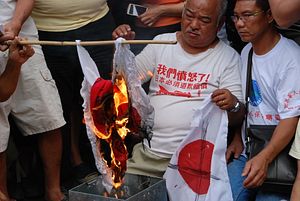On Tuesday, The Hague-based Permanent Court of Arbitration is set to hand down a decision in Philippines v. China, a case initiated in 2013 when Manila asked the international arbitration body to decide questions of maritime entitlements in the South China Sea. As of this writing, the decision is hours away. Analysis at The Diplomat and elsewhere has widely anticipated a result that favors Manila. The ruling could potentially deal a blow to China’s claim of “historic rights” in the waters of the South China Sea in addition to its ambiguous nine-dash line claim.
One of the questions analysts have sought to answer is what China might look to do in the aftermath of an unfavorable verdict. (Here I’d recommend referring to recent commentaries by Bill Hayton and M. Taylor Fravel; I also wrote in May on the prospect of China declaring a South China Sea air defense identification zone after the decision.) Something I haven’t seen discussed in great detail is the possibility of anti-American protests in China as a result of the decision. In the lead up to the verdict, China has spent considerable attention emphasizing its position that the PCA has no jurisdiction in the case. Moreover, as a recent video series by Xinhua, China’s state news agency, dubbed “Truth Beyond the Waves,” demonstrates, Beijing is putting the blame for tensions in the South China Sea at the feet of the United States.
As numerous press statements by the Chinese foreign ministry have made clear, Beijing holds Washington responsible for militarizing the South China Sea. Some in China have even suggested that Manila’s decision to file the case back in 2013 was born of U.S. support. One of the aforementioned Xinhua videos features Admiral Harry B. Harris, the commander of U.S. Pacific Command, testifying before the Senate Armed Services Committee, before clarifying that the “valuable peace” in the region has been “broken by frequent visits of American warships and airplanes.” The Xinhua narrator, of course, is referring to U.S. freedom of navigation operations and surveillance flights — both points of tension between China and the United States. Finally, a front page editorial in the People’s Daily, another Communist Party mouthpiece, outright cast the PCA case as a foreign “plot” against China.
With the likely outcome that the PCA verdict will embarrass China, pointing out that its conduct and claims in the South China Sea are illegal under international law, it’s not unthinkable that we may see protests against the United States within the country. Any popular protest, of course, would need the tacit blessing of the Chinese state. Here, the examples of the 1999 protests in the aftermath of the U.S. bombing of the Chinese embassy in Belgrade and the 2012 protests against Japan following its nationalization of the Senkakus are instructive.
In 1999, then-vice president of China (and future president), Hu Jintao, said that the protests “fully reflect the Chinese people’s great fury at the atrocity of the embassy attacks by NATO and the Chinese people’s strong patriotism.” 1999, of course, was a different time in U.S.-China relations. The protests back then were severe, effectively holding then-U.S. Ambassador James Sasser and his staff hostage inside the U.S. embassy for days. Though a repeat of the 1999 protests is unlikely, it’s not unthinkable that President Xi Jinping could grant his imprimatur to some degree of protesting.
Chinese behavior in the South China Sea does interact with and feed on nationalistic sentiment at home. China’s position on the disputes and its claim to “historic rights” in the region may seem untenable and absurd to external observers, but the fact remains that the Chinese government deeply and genuinely believes that these waters are innately Chinese. The language couching China’s claims isn’t a cynical construct to preserve Beijing’s rights to exploit the maritime resources of the South China Sea and explore for hydrocarbon deposits; it’s a forthright expression of national entitlement.
Whatever Beijing’s planned strategic reaction to the verdict may be — including a possible ADIZ, withdrawal from UNCLOS, or even the declaration of straight baselines in the Spratlys — we shouldn’t be taken by surprise if there are protests.

































